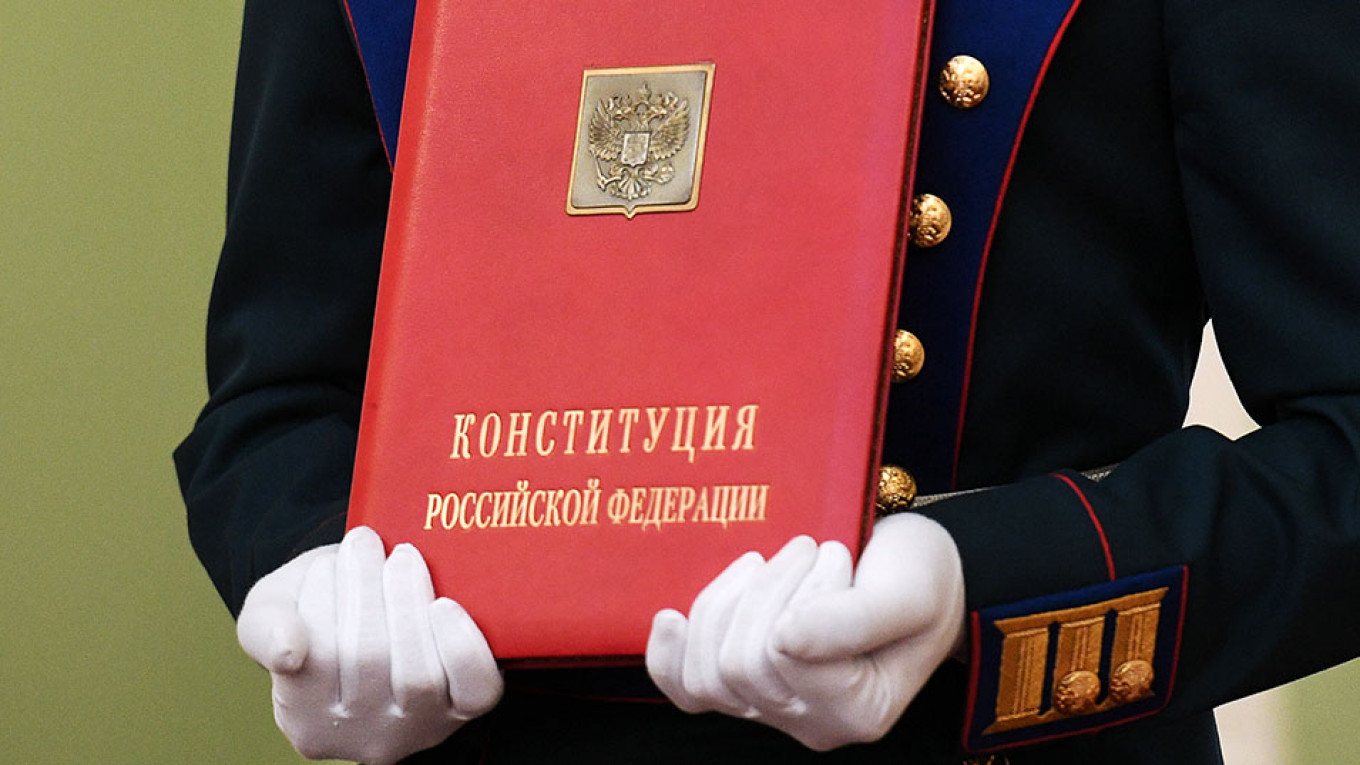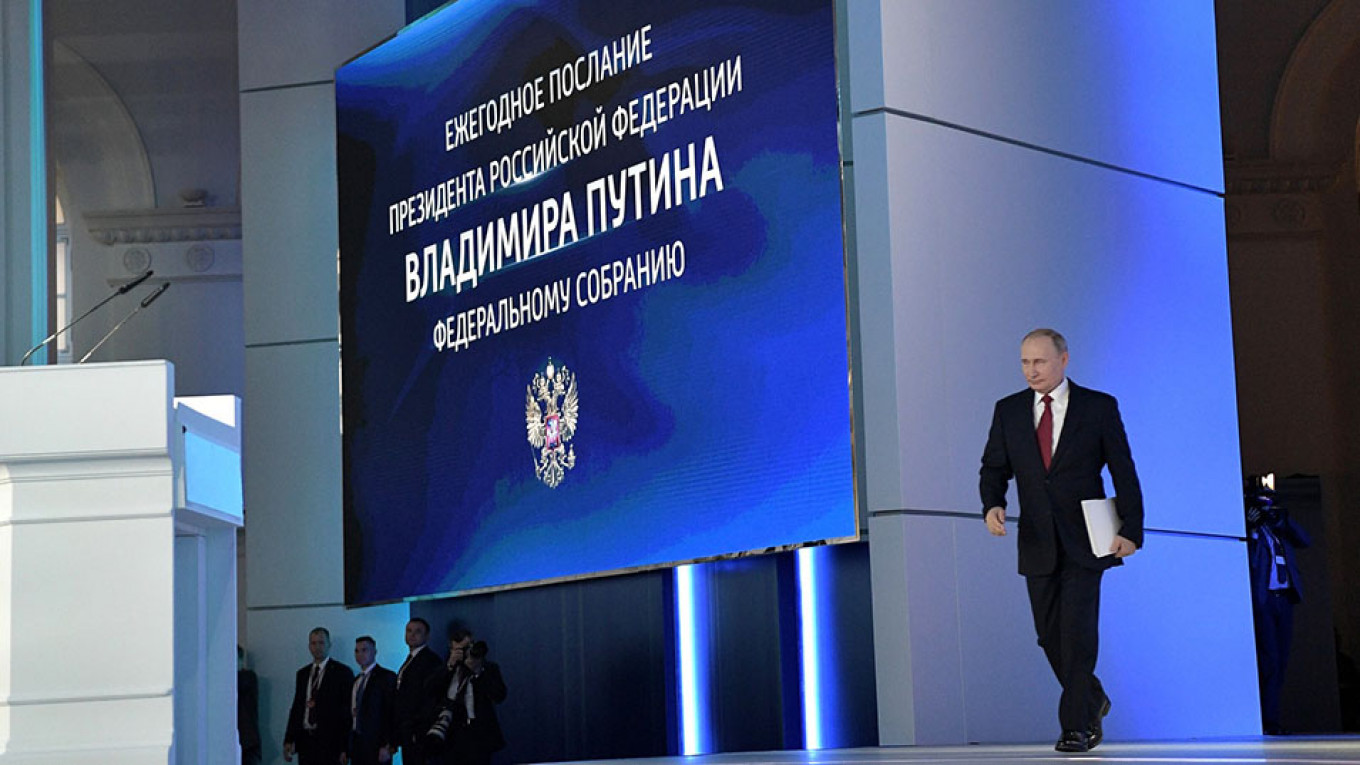All of a sudden, 2024 feels far less distant.
With Wednesday’s surprise proposal by President Vladimir Putin to change Russia’s constitution, announced during an address to both houses of Russia’s parliament, and the resignation of the cabinet of Prime Minister Dmitry Medvedev, whose ministers reportedly found out about the government’s dissolution at the last minute, the transition of power in Russia is no longer abstract. It is now a very real process with serious ramifications for political life in Russia.
The move to diffuse political power across multiple institutions — parliament, the State Council, and the presidency, the last of these the dominant actor in politics since 1993 — comes as a shock because of its timing.
The State Council option, which involves Putin rising ‘above politics’ yet continuing to exert influence by formalizing and heading that institution upon the completion of his final presidential term, is not new to observers of Russia’s so-called 2024 problem; nor is the idea of Putin empowering Russia’s docile legislature on his way out the door. (Remaining in office as president for a fifth term is not on the cards, with one of Putin’s proposed amendments a two-term limit on the presidency.) What is unexpected is Putin’s decision to signal his intentions regarding the succession this early.
Upon Putin’s re-election in March 2018, it seemed probable that details of the 2024 succession and post-2024 power-sharing arrangements would not come to light until late in Putin’s fourth term, for straightforward reasons.
Because political power in Russia’s super-presidential system is concentrated in the presidency, with the State Duma famously ‘not a place for discussion’ but rather an arena for intra-executive struggles and the regions reined in during Putin’s first years in office, the stakes facing elites as 2024 neared could credibly be described as ‘winner takes all.’
Elites unsure of whether they would wield influence after Putin’s departure had much to lose from alienating him by rocking the boat, while elites aware that life after Putin bodes well for rivals and ill for oneself, with the largest slice of the pie reserved for the former, had everything to gain from successfully contesting the president’s plan.
By marrying the State Council and ‘strong parliament’ options, all at his successor’s expense, Putin has diffused political power enough that elites should feel reassured that they will wield at least some influence after 2024.

The presidency will remain dominant in the areas of foreign and security policy yet lose the ability to appoint ministers and deputy ministers, including the prime, foreign, and defense ministers, to parliament, somewhat reducing the costs to elites if a rival is appointed president.
In the long-term, it may even contribute to pluralism in Russian politics such as by opening up the possibility of a renewed role for the legislature in foreign affairs. It would be a secondary role, granted, but one recalling the 1990s, when lawmakers could not overrule the president but freely and vocally disagreed with his foreign policy, stimulating a debate on Russia’s foreign relations that went silent under Putin.
Finally, in a move recalling earlier appointments of obscure technocrats as prime minister and the logic of his own appointment as president by Boris Yeltsin, Putin has gone with tax chief Mikhail Mishustin as his pick for the role.
Like President Putin at the turn of the century, Prime Minister Mishustin, who has ties to both the siloviki and the so-called economic bloc, may prove so inoffensive a choice that disparate elites ultimately coalesce around him. For his part, the deeply unpopular Medvedev, who entered Putin’s fourth term as the designated scapegoat for the austerity measures that followed and has now been relegated to the role of Putin’s deputy on the Security Council, appears to have been sidelined.
None of this answers the question why now, however. And here lies perhaps the greatest surprise, for few really believed that Putin would completely disappear from political life in 2024.
Remarkably, it does not seem that Putin’s was forced by pressure from elites, who have in recent years fought side battles with one another with an eye to shaping the balance of power in the run-up to 2024 — recall the Abyzov and Ulyukayev affairs — but kept the president out of it. Instead, it may have been public opinion.
To be sure, ordinary Russians have not been taking to the streets to demand that Putin clarify his future career plans. But their dissatisfaction with austerity measures (especially the raising of retirement ages), state corruption and government incompetence — all problems that have become more egregious since Putin’s reelection — is at record highs.
This has taken its toll on the popularity of the president, the government and the party of power, United Russia, whose future is in question as the 2021 parliamentary elections approach.
The erosion of the political system’s pillars of legitimacy — a self-inflicted wound — may have led Putin to conclude that he did not have the luxury of waiting until 2023 to reveal his plan for 2024 and beyond.
That something as politically significant as the unveiling of the manner of Putin’s exit from the presidency may have been hastened by the authorities’ own missteps and the public outrage they provoked may be the biggest shock of all.
A Message from The Moscow Times:
Dear readers,
We are facing unprecedented challenges. Russia's Prosecutor General's Office has designated The Moscow Times as an "undesirable" organization, criminalizing our work and putting our staff at risk of prosecution. This follows our earlier unjust labeling as a "foreign agent."
These actions are direct attempts to silence independent journalism in Russia. The authorities claim our work "discredits the decisions of the Russian leadership." We see things differently: we strive to provide accurate, unbiased reporting on Russia.
We, the journalists of The Moscow Times, refuse to be silenced. But to continue our work, we need your help.
Your support, no matter how small, makes a world of difference. If you can, please support us monthly starting from just $2. It's quick to set up, and every contribution makes a significant impact.
By supporting The Moscow Times, you're defending open, independent journalism in the face of repression. Thank you for standing with us.
Remind me later.








